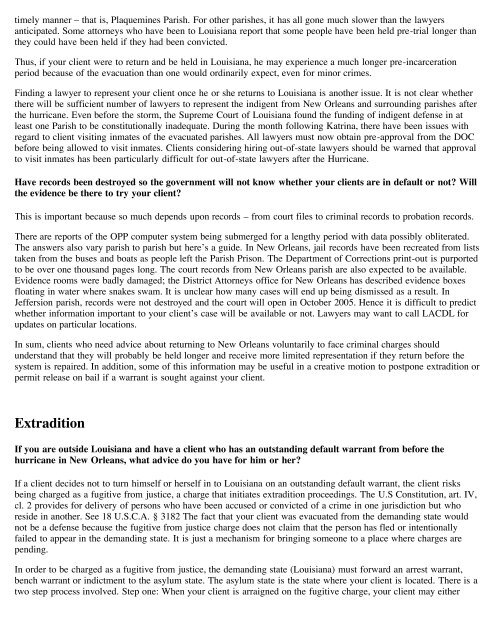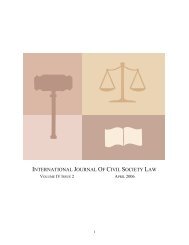Hurricane Katrina: Legal Issues - Columbus School of Law
Hurricane Katrina: Legal Issues - Columbus School of Law
Hurricane Katrina: Legal Issues - Columbus School of Law
Create successful ePaper yourself
Turn your PDF publications into a flip-book with our unique Google optimized e-Paper software.
timely manner – that is, Plaquemines Parish. For other parishes, it has all gone much slower than the lawyers<br />
anticipated. Some attorneys who have been to Louisiana report that some people have been held pre-trial longer than<br />
they could have been held if they had been convicted.<br />
Thus, if your client were to return and be held in Louisiana, he may experience a much longer pre-incarceration<br />
period because <strong>of</strong> the evacuation than one would ordinarily expect, even for minor crimes.<br />
Finding a lawyer to represent your client once he or she returns to Louisiana is another issue. It is not clear whether<br />
there will be sufficient number <strong>of</strong> lawyers to represent the indigent from New Orleans and surrounding parishes after<br />
the hurricane. Even before the storm, the Supreme Court <strong>of</strong> Louisiana found the funding <strong>of</strong> indigent defense in at<br />
least one Parish to be constitutionally inadequate. During the month following <strong>Katrina</strong>, there have been issues with<br />
regard to client visiting inmates <strong>of</strong> the evacuated parishes. All lawyers must now obtain pre-approval from the DOC<br />
before being allowed to visit inmates. Clients considering hiring out-<strong>of</strong>-state lawyers should be warned that approval<br />
to visit inmates has been particularly difficult for out-<strong>of</strong>-state lawyers after the <strong>Hurricane</strong>.<br />
Have records been destroyed so the government will not know whether your clients are in default or not? Will<br />
the evidence be there to try your client?<br />
This is important because so much depends upon records – from court files to criminal records to probation records.<br />
There are reports <strong>of</strong> the OPP computer system being submerged for a lengthy period with data possibly obliterated.<br />
The answers also vary parish to parish but here’s a guide. In New Orleans, jail records have been recreated from lists<br />
taken from the buses and boats as people left the Parish Prison. The Department <strong>of</strong> Corrections print-out is purported<br />
to be over one thousand pages long. The court records from New Orleans parish are also expected to be available.<br />
Evidence rooms were badly damaged; the District Attorneys <strong>of</strong>fice for New Orleans has described evidence boxes<br />
floating in water where snakes swam. It is unclear how many cases will end up being dismissed as a result. In<br />
Jeffersion parish, records were not destroyed and the court will open in October 2005. Hence it is difficult to predict<br />
whether information important to your client’s case will be available or not. <strong>Law</strong>yers may want to call LACDL for<br />
updates on particular locations.<br />
In sum, clients who need advice about returning to New Orleans voluntarily to face criminal charges should<br />
understand that they will probably be held longer and receive more limited representation if they return before the<br />
system is repaired. In addition, some <strong>of</strong> this information may be useful in a creative motion to postpone extradition or<br />
permit release on bail if a warrant is sought against your client.<br />
Extradition<br />
If you are outside Louisiana and have a client who has an outstanding default warrant from before the<br />
hurricane in New Orleans, what advice do you have for him or her?<br />
If a client decides not to turn himself or herself in to Louisiana on an outstanding default warrant, the client risks<br />
being charged as a fugitive from justice, a charge that initiates extradition proceedings. The U.S Constitution, art. IV,<br />
cl. 2 provides for delivery <strong>of</strong> persons who have been accused or convicted <strong>of</strong> a crime in one jurisdiction but who<br />
reside in another. See 18 U.S.C.A. § 3182 The fact that your client was evacuated from the demanding state would<br />
not be a defense because the fugitive from justice charge does not claim that the person has fled or intentionally<br />
failed to appear in the demanding state. It is just a mechanism for bringing someone to a place where charges are<br />
pending.<br />
In order to be charged as a fugitive from justice, the demanding state (Louisiana) must forward an arrest warrant,<br />
bench warrant or indictment to the asylum state. The asylum state is the state where your client is located. There is a<br />
two step process involved. Step one: When your client is arraigned on the fugitive charge, your client may either

















